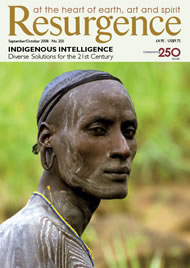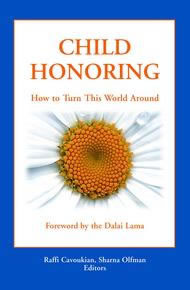EARLIER THIS YEAR a group of us on a course at Schumacher College watched a recording of a twelve-year-old, Severn Cullis-Suzuki, at the Rio Earth Summit in 1992, making an impassioned, articulate and powerful speech: “Losing my future is not like losing an election or a few points on the stock exchange,” she pointed out, in a voice breaking with emotion. Some of the delegates also appeared to be close to tears. Sixteen years on, does it look like we have listened to her?
This book is co-edited by Cullis-Suzuki’s mentor, Canadian ‘Children’s Troubadour’ Raffi Cavoukian. With his co-editor Sharna Olfman he has brought together a number of writers, researchers and thinkers to support the movement he has founded called Child Honouring.
When faced with a choice of actions, Gandhi taught us to think of the face of the poorest and most deprived person you have ever seen and ask if what you plan to do will help them. Aldo Leopold proposed another ethic for deciding a course of action: “A thing is right when it tends to preserve the integrity, stability and beauty of the biotic community; it is wrong when it tends otherwise.” Raffi asks us to accept a new principle: that “the irreducible needs of all children can offer a unifying ethic by which the cultures of our interdependent world might reorder their priorities.”
Indeed they might; for it must be said that in large part this is not a world fit for children. Whilst children in poorer countries are still dying of measles and pneumonia, a new paediatric morbidity threatens children in the West, with evidence of rising incidences of asthma, childhood cancer, birth defects and neurodevelopmental disorders. Whilst children in poor countries still go to bed hungry and thirsty, children in richer countries increasingly suffer from obesity and nutritional disorders.
In the West our awareness of the dangers to children seems to make us individually protective rather than politically active; we drive our children to school rather than demand safe routes for walking; we buy organic baby food rather than campaign for all food to be safe. But we cannot shop our way out of these problems, and even mothers’ milk is contaminated. There are no individual solutions to this; as Sandra Steingraber says in a warm and witty essay, “Our children are the jet stream, the global food web, and the water cycle. Their lungs absorb oxygen provided them by oceans of plankton and valleys of rainforests. Rainwater flows through their capillaries.”
But, more than that, we need to rediscover traditions of childcare that always honoured the child, and above all support primary caregivers in their hard work to nurture the next generation. As Olfman remarks drily, “There is no money to be made in informing parents that breastfeeding, holding and singing to their infants are optimal for their development.” Lorna Williams, a member of the Lil’wat First Nation, reminds us of this. She recalls how the Canadian government allowed missionaries to forcibly remove children from their families to break apart the First Nations’ cultural traditions and community life, and how this led to disintegration of families and societies. She sets out child-honouring practices that begin with care for the expectant mother, through to supporting the emerging individuality of an adolescent.
In an eloquent and moving piece, Paulo Wangoola, a Ugandan writer, uncompromisingly summarises the problem: “A consumerist logic may cater to the material needs of children, but it ignores their spiritual and emotional needs.” Taking us back to creation stories, he explains the Ubuntu philosophy: “ I Am Because You Are; And Because We Are, Therefore I Am.” Western science is “the science of dishonouring everything and everybody”; indigenous science teaches that “the Earth, plants and animal are not factors of production for private profit, but God’s sacred bounty for human sustenance.”
This is a rich mixture of a book, at times folksy, at times thoroughly academic. It is surprising, enlightening and offers unusual perspectives. You may think, “Of course children’s needs come first; what is there to argue about?” This book helps us to see what it would mean if we really took that seriously and acted on it: it would in fact require us to ‘turn the world around’. •







